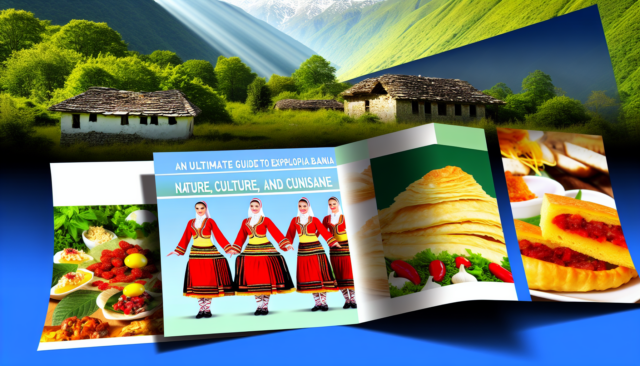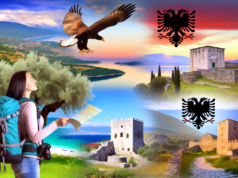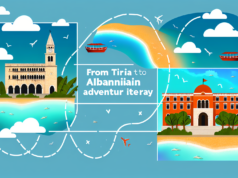
Nestled in the heart of the Balkans, Albania is rapidly emerging as a premier travel destination that offers an enticing blend of untouched nature, rich culture, and delectable cuisine. With pristine beaches along the Adriatic and Ionian Seas, rugged mountains, diverse wildlife, and historical sites dating back millennia, Albania invites travelers to explore its unique tapestry. This ultimate guide will help you navigate this hidden gem of Southeast Europe, allowing you to fully appreciate its natural wonders, cultural heritage, and culinary delights.
Nature: The Wilderness of Albania
The Albanian Riviera
One of Albania’s most captivating attractions is its coastline, particularly the Albanian Riviera. Stretching from the town of Vlorë to the border with Greece, this region is dotted with picturesque beaches, crystal-clear waters, and charming coastal villages. Places like Dhërmi, Jale Beach, and Himara offer breathtaking views and opportunities for swimming, sunbathing, and various water sports.
The Albanian Alps
For those who crave adventure and stunning landscapes, the Albanian Alps are a must-visit. Known as the "Accursed Mountains" (Alpet e Kreshnikëve), this rugged terrain boasts dramatic peaks, lush valleys, and traditional mountain villages such as Theth and Valbona. Hiking enthusiasts can explore well-marked trails that take you through enchanting scenery, including breathtaking waterfalls, pristine lakes, and rich biodiversity.
Nature Reserves
Albania is home to several national parks and nature reserves that protect its unique ecosystems. The Butrint National Park, a UNESCO World Heritage site, showcases both natural beauty and archaeological treasures. Here, visitors can wander through ancient ruins while surrounded by lush flora and fauna. Other notable parks include the Divjakë-Karavasta National Park, famous for its diverse bird species, and the Llogara National Park, where mountains meet the sea.
Culture: A Tapestry of Traditions
Historical Heritage
Albania’s history is rich and varied, influenced by various civilizations, including the Illyrians, Romans, Byzantines, and Ottomans. A visit to the capital city, Tirana, offers a glimpse of the country’s recent history, with sights like Skanderbeg Square, the iconic Et’hem Bey Mosque, and the National Historical Museum. For a deeper dive into the past, explore the ancient city of Butrint or the well-preserved castle of Gjirokastër, both UNESCO World Heritage sites.
Local Traditions and Festivals
Albania boasts a vibrant cultural scene characterized by traditional music, dance, and festivals. The country’s folk music features unique instruments like the çifteli and is often accompanied by traditional dances, such as the "valla." Festivals such as the Gjirokastër Culture Festival and the annual Albanian National Folk Festival in Gjirokastër celebrate this rich cultural heritage, showcasing local arts, crafts, and performances.
Warm Hospitality
One of the hallmarks of Albanian culture is the warmth and friendliness of its people. Albanian hospitality is legendary, and visitors are often welcomed into homes for a cup of "raki" (a traditional fruit brandy) and homemade meals. Engaging with locals is a great way to immerse yourself in the culture and gain insights into daily life in Albania.
Cuisine: A Culinary Journey
Traditional Dishes
Albanian cuisine is a delightful fusion of Mediterranean and Balkan influences. Staples include fresh vegetables, meats, and dairy products, with a focus on local and seasonal ingredients. Must-try dishes include:
- Fërgesë: A baked dish made with peppers, tomatoes, and cottage cheese, often served with bread.
- Tavë Kosi: A traditional baked dish made with lamb and rice, topped with a yogurt and egg mixture.
- Byrek: Savory pastries filled with cheese, spinach, or meat, perfect for a snack on the go.
Seafood and Olive Oil
Given its extensive coastline, Albania offers some of the freshest seafood in the region. Enjoy grilled fish, calamari, or specialty dishes like "peshk i bërë në zgarë" (grilled fish) at seaside restaurants with stunning views. The country is also known for its high-quality olive oil, which is an essential component of many dishes.
Sweet Treats
No culinary journey in Albania would be complete without indulging in some traditional desserts. Sample "Baklava," a sweet pastry made of layers of filo filled with nuts and honey, or try "Çoko Dita," a chocolate dessert that reflects the country’s Balkan influences.
Planning Your Trip
Best Time to Visit
The ideal time to visit Albania is during spring (April to June) and early autumn (September to October) when the weather is pleasantly mild and the tourist crowds are smaller. Summer months can be hot, particularly along the coast, and are popular for beachgoers.
Transportation
Albania has a developing transportation infrastructure, making traveling between cities and attractions relatively easy. Buses and minibusses connect major cities, while car rentals allow for freedom and exploration of rural areas. For those seeking adventure, hiking and biking are excellent ways to experience Albania’s stunning landscapes.
Safety and Practical Tips
Albania is generally safe for travelers, but it’s always wise to take standard precautions, such as avoiding walking alone at night in unfamiliar areas and keeping an eye on your belongings. Learning a few basic phrases in Albanian can go a long way and is appreciated by the locals.
Conclusion
Albania is a destination that is rich in natural beauty, cultural heritage, and culinary excellence. From the stunning beaches of the Albanian Riviera to the ruggedness of the Alps and the warmth of its people, Albania offers an unforgettable experience for travelers seeking authenticity and adventure. As it continues to unveil its treasures, Albania is sure to captivate the hearts and minds of those who venture into its enchanting landscapes. So pack your bags and get ready for an adventure in one of Europe’s hidden jewels!













